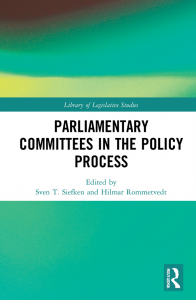New Chapter Alert! Parliamentary Committees in the Policy Process
Politics Lecturer Mark Goodwin has a chapter in the recently-released volume by Siefken and Rommetvedt.

Mark writes: Rupert Murdoch being attacked with a custard pie. Sir Philip Green asking MPs to ‘stop staring’ at him. Dominic Cummings comparing the serving Prime Minister to a broken shopping trolley and accusing the serving Health Secretary of habitually lying about the government response to COVID-19. These are just some of the highlights of recent meetings of committees of the UK Parliament, a subject on which Dr Mark Goodwin, Lecturer in Politics in the School of Humanities has recently contributed a chapter to an edited book. Parliamentary Committees in the Policy Process (eds. Siefken and Rommetvedt) examines the parliamentary committee through 15 national case studies examining the different roles played by these near-ubiquitous institutions in making law, overseeing the work of government, and engaging the public in parliamentary processes.
Committees are rarely the public face of democratic politics, yet they are often seen as the true ‘workhorses’ of parliamentary politics. US President (and politics academic) Woodrow Wilson endorsed this view, claiming that in the American case “Congress in session is Congress on public exhibition, whilst Congress in its committee rooms is Congress at work”. The book tests this claim in a range of settings around the world. Dr Goodwin’s chapter (co-authored with Dr Stephen Holden Bates (Birmingham), Dr Louise Thompson (Manchester) and Professor Stephen McKay (Lincoln)) examines the committees system in the UK House of Commons. The House of Commons is often regarded as an outlier due to its structure (there are different types of committee for making law and for scrutinising the work of government and others, unlike in most parliaments) and its relative weakness. In recent years, the system has gained much greater public visibility, but as Dr Goodwin’s research into the subject has demonstrated, this greater visibility is not necessarily related to greater power, influence or effectiveness and committees continue to reflect all of the strengths and weaknesses of the wider British parliamentary state. The book analyses committee systems in Europe, the USA, Africa and the Middle East in each case testing the claim often made but equally often unsupported, that committees are ‘where the real work gets done’.